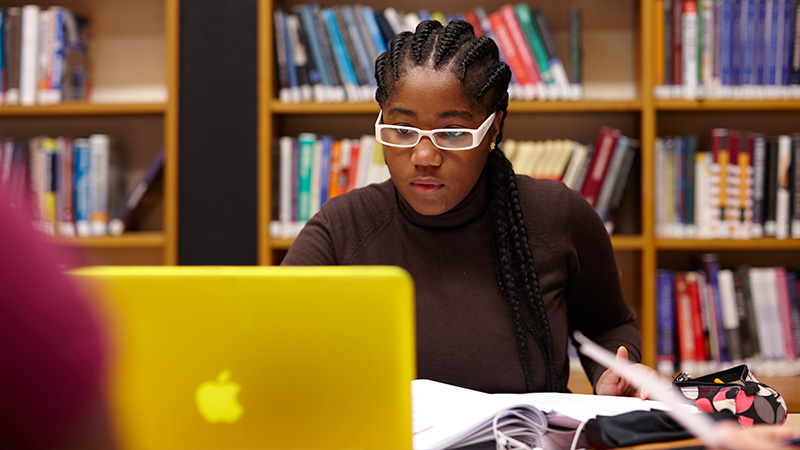Start dates: September 2025 / September 2026
Full time: PGCert: 4 months, PGDip: 8 months, MA: 12 months
Part time: PGCert: 2 semesters, PGDip: 3 semesters, MA: 24 months
Location: Headington
Overview
Whether words come easily to you, or you work tirelessly at every sentence, we want to help you bring your writing craft to a professional level. We’re looking for passion, no matter your background or level of experience. Every writer might be different - but every writer can benefit from the insight of our published experts.
Our Creative Writing MA is a well-established course taught by acclaimed professional writers published around the world. You’ll benefit from the input of creative writing fellows and visiting lecturers such as Patience Agbabi, Sally Bayley, and Steven Hall. And you’ll be studying in one of the world’s great literary cities.
You'll gain a better understanding of your craft and how to apply it to different literary genres and forms. You’ll also meet and pitch your work to top literary agents Felicity Bryan Associates and publisher Philip Gwyn Jones. Whether or not you aspire to get published, we’ll support and encourage you all the way to achieving your full writing potential.
Why Oxford Brookes University?
-
Expert academics
Our teaching staff are prize-winning writers who will pass on their experience through seminars and workshops.
-
Entry based on talent
We’ll assess your portfolio of work to see how we can best support you to grow as a writer.
-
Collaborative working
Small groups help to build trust among peers and tutors.
-
Industry connections
Pitch your work to literary agents. Any graduating student who achieves a distinction is guaranteed to have their work read by a publisher.
-
Flexible awards
You’ll learn a lot about yourself and you may find that the full MA isn’t right for you. You can choose to finish with a PGDip or PGCert.
Course details
Study modules
The modules listed below are for the master's award.
All students take the core compulsory module The Writing Studio. In addition:
- MA students choose two elective modules and complete the The Writing Project.
- PGDip students choose two elective modules.
- PGCert students choose one elective module.
Please note: As our courses are reviewed regularly as part of our quality assurance framework, the modules you can choose from may vary from those shown here. The structure of the course may also mean some modules are not available to you.
Research
Our commitment to research-led teaching means that all our teaching staff are recognised experts in their field. They contribute to the canon of published work in their specialist fields influencing debate and discussion. And they value the opportunity to share their ideas with students through their teaching.
We are home to the Oxford Brookes Poetry Centre, which:
- creates a space for discussion and research
- promotes connections between poets, academics, and readers of poetry in the local community
- sponsors readings by poets, such as Simon Armitage, and a regular seminar series.
Research supervision is offered in the following areas:
- English 20th-century poetry – particularly Eliot and Heaney
- Irish writing
- Modernist drama
- Witchcraft in the 19th century
- John Clare and eco-criticism
- Sir Walter Scott
- Ben Jonson
- Shakespeare
- Theatre and science
- Utopia
- Contemporary literature
- Thomas More
- Modernist poetry
- Stylistics
- Creativity
- Franz Kafka
- Victorian religion
- Literature and war.

Careers
On the MA Creative Writing course, we’ve had a lot of success in producing brilliant writers. However, we’re not a factory for producing writers. That’s why many of our graduates take their newly acquired skills to companies and organisations such as the UK Civil Service, Ralph Trustees Ltd, Hestia Charity and the National Trust. Whether it’s critical thinking, creative problem-solving, or research, you’ll be highly prized in sectors such as:
- PR, marketing and communications
- NGOs and charities
- research
- teaching
- higher education
- publishing
- media and journalism.
Student profiles
Our Staff
Dr Morag Joss
Morag Joss is the award-winning author of the Sara Selkirk novels, Half Broken Things, Puccini’s Ghosts, The Night Following, Among the Missing (Across the Bridge) and Our Picnics in the Sun. She has also written for television, and writes short stories for print and broadcast. Her prizes and shortlistings include the CWA Silver Dagger, the USA Edgar Award for best novel, and a Heinrich Böll residency on the island of Achill, Ireland.
Read more about MoragRelated courses
Entry requirements
Specific entry requirements
Applicants should normally hold a good honours degree (2.2 or above), or equivalent, in an appropriate discipline and must be able to demonstrate ability in creative writing.
A portfolio of recent creative work must be submitted consisting of 2000 words prose, or 5 poems, or a proportionate mixture of the two. Applicants may also be interviewed. If it is some time since you completed your undergraduate education and you do not meet the standard requirement, it may be possible to consider your application based on evidence of other relevant personal and professional experience, the support of your referees and your portfolio of written work.
Please also see the University's general entry requirements.
English language requirements
Applicants whose first language is not English should hold one of the following qualifications:
- British Council (IELTS) Test: band 7 overall with at least 6 in each band
- Cambridge Certificate of Proficiency: grade C or above
- NEAB University Test in English for Speakers of Other Languages: Pass
- JMB Test in English for Overseas Students: grade 1, 2 or 3.
Please also see the University's standard English language requirements.
Pathways courses for international and EU students
We offer a range of courses to help you meet the entry requirements for your postgraduate course and also familiarise you with university life in the UK.
Take a Pre-Master's course to develop your subject knowledge, study skills and academic language level in preparation for your master's course.
If you need to improve your English language, we offer pre-sessional English language courses to help you meet the English language requirements of your chosen master’s course.
English requirements for visas
If you need a student visa to enter the UK you will need to meet the UK Visas and Immigration minimum language requirements as well as the University's requirements. Find out more about English language requirements.
Terms and conditions of enrolment
When you accept our offer, you agree to the Terms and Conditions of Enrolment. You should therefore read those conditions before accepting the offer.
International qualifications and equivalences
How to apply
Application process
All applications for the MA in Creative Writing must be accompanied by a portfolio of recent creative work.
This must consist of 2000 words prose, or 5 poems, or a proportionate mixture of the two.
Tuition fees
Questions about fees?
Contact Student Finance on:
Tuition fees
Fees quoted are for the first year only. If you are studying a course that lasts longer than one year, your fees will increase each year.
The following factors will be taken into account by the University when it is setting the annual fees: inflationary measures such as the retail price indices, projected increases in University costs, changes in the level of funding received from Government sources, admissions statistics and access considerations including the availability of student support.
How and when to pay
Tuition fee instalments for the semester are due by the Monday of week 1 of each semester. Students are not liable for full fees for that semester if they leave before week 4. If the leaving date is after week 4, full fees for the semester are payable.
- For information on payment methods please see our Make a Payment page.
- For information about refunds please visit our Refund policy page
Additional costs
Please be aware that some courses will involve some additional costs that are not covered by your fees. Specific additional costs for this course are detailed below.
Optional costs
| Additional costs | Amount (£) |
|---|---|
You may choose to purchase books to support your studies. Many books on our reading lists are available via the Library, or can be purchased secondhand. |
£10-30 |
It’s your responsibility to cover print / binding costs where coursework submission is required. Please note that a lot of the coursework is now submitted online. |
From £30 |
Accommodation fees in Brookes Letting (most do not include bills) |
£94-265 per week |
Accommodation fees in university halls (bills included, excluding laundry costs) |
£122-180 per week |
Graduation costs include tickets, gowning and photography. Gowns are not compulsory but typically students do hire robes, starting at £41. |
Typically £0-200 |
Students are responsible for their own travel to and from university for classes. BrookesBus travel is subsidised for full-time undergraduate students that are on a course with a fee of £9,250 or more, or living in an Oxford Brookes hall of residence. There is an administration fee for the production of a BrookesKey. |
From £10 |
Funding your studies
Financial support and scholarships
Featured funding opportunities available for this course.
The Faculty of Humanities and Social Sciences believes strongly in the importance of making a difference to the world of our students, and in the ability and potential of our students to make a difference in the world. The Dean's Scholarship is one small way in which we make that belief tangible.
International students can apply for our International Students Scholarship. Please click on the link below to find out more.
All financial support and scholarships
Programme changes:
On rare occasions we may need to make changes to our course programmes after they have been
published on the website. For more information, please visit our
changes to programmes page.

